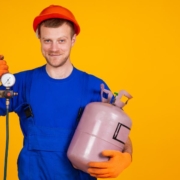Why Does My AC Compressor Shut Off After 2-3 Minutes
An air conditioner (AC) compressor is a key component that circulates refrigerant and enables the system to cool indoor air. If the compressor shuts off after just 2-3 minutes, it indicates a problem that can affect cooling efficiency, energy consumption, and system lifespan. Understanding the causes helps prevent further damage and ensures proper operation.
Common Causes of Short Cycling
Short cycling occurs when an AC turns on and off rapidly, usually within a few minutes. This issue can be caused by electrical, mechanical, or environmental factors. One common reason is an incorrect refrigerant charge. Low refrigerant levels reduce pressure in the system, causing the compressor to shut off to prevent damage. Overcharging can also create high pressure, triggering a similar response.
A malfunctioning thermostat can cause short cycling. If the thermostat inaccurately reads indoor temperature or has faulty wiring, it may signal the compressor to turn off prematurely. Incorrect thermostat placement near heat sources like sunlight or electronics can also lead to this problem.
Dirty or blocked air filters restrict airflow, forcing the compressor to overheat and shut down. Similarly, clogged evaporator coils reduce heat exchange, causing the system to strain. In some cases, electrical issues such as a faulty capacitor, relay, or contactor can prevent the compressor from running continuously. The capacitor provides the necessary starting and running power, and failure can lead to rapid shutdowns.
Compressor short cycling may also result from an oversized AC unit. A unit larger than the cooling requirements of the home reaches the set temperature too quickly and turns off repeatedly. Environmental factors, such as extreme heat, can exacerbate the issue by causing the system to overheat.
How to Identify the Problem
Observing the AC’s behavior helps identify the underlying cause. Check the duration of each cooling cycle and note temperature fluctuations. Inspect the air filter for dirt or blockage. Listen for unusual noises from the compressor, which may indicate mechanical or electrical issues. Checking refrigerant pressure requires specialized gauges and is usually performed by a licensed HVAC technician.
Regular maintenance records, including coil cleaning and refrigerant checks, provide insight into recurring problems. Identifying patterns helps determine whether the issue is electrical, mechanical, or related to airflow and sizing.
Preventive Measures
Maintaining proper refrigerant levels ensures the compressor operates within safe pressure ranges. Replace or clean air filters every 1-3 months depending on usage and indoor conditions. Clean evaporator and condenser coils to improve heat exchange and airflow. Installing a correctly sized AC unit for the home’s square footage prevents rapid temperature cycling. Ensure the thermostat is calibrated and located away from heat sources. Professional inspection of capacitors, relays, and wiring helps prevent electrical failures.
FAQ
What is short cycling in an AC?
Short cycling occurs when the AC compressor turns on and off rapidly, usually within a few minutes, reducing efficiency and increasing wear.
Can low refrigerant cause the compressor to shut off quickly?
Yes, insufficient refrigerant reduces system pressure, triggering the compressor to shut down to prevent damage.
Can a dirty air filter cause short cycling?
Yes. Restricted airflow from a clogged filter can cause the compressor to overheat and turn off prematurely.
Is an oversized AC unit a problem?
Yes. An oversized unit cools the space too quickly, leading to frequent on-off cycles that stress the compressor.
When should I call a professional?
If the compressor short cycles repeatedly, produces unusual noises, or refrigerant levels and electrical components need checking, contact a licensed HVAC technician.
Conclusion
An AC compressor shutting off after 2-3 minutes signals short cycling, which can stem from low or high refrigerant levels, thermostat issues, dirty filters, electrical faults, or incorrect unit sizing. Short cycling decreases cooling efficiency, increases energy use, and may damage the compressor over time. Regular maintenance, including coil cleaning, filter replacement, and refrigerant checks, helps prevent premature shutdowns. Accurate thermostat placement and correct AC sizing are essential for stable operation. Timely professional inspection ensures the system operates efficiently and extends its lifespan.

